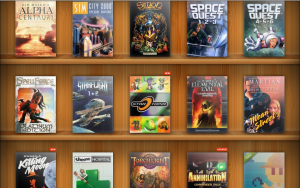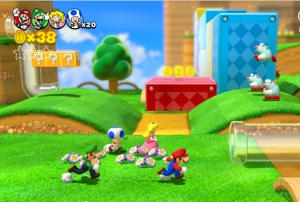Today’s post is going to be a bit indulgent so please bear with me. This week I made a big upgrade to my setup by replacing my old monitor with a HD one and a new desk to fit it all in. As I shuffled things around, I had to pack up a number of CDs and DVD cases of games that I no longer have the space for at my desk, but haven’t looked at in years. The move to digital away from physical has been a godsend, but it has me thinking once again about the struggle to get awareness of video game preservation.
Virtual Storage:
One of the biggest benefits that digital distribution platforms like Steam have given gamers would be the ability to store your games on a digital account instead of needing physical space. I have over 800 games on Steam and I don’t think I would have the room to store them in a physical location. However there is one thing about physical copies that gives them value over digital, they are own able property. Nobody can patch the content of a DVD and as long as you have a working drive you can use them over and over again.
One of the important parts of preserving something is having the original in good condition; something that you can make use of whenever and however you want. The problem with digital copies of games is that the game itself is tethered to a third party service and not easily reproducible. From a developer’s point of view, not being able to copy games to give your friends is great for business and cuts down on piracy, but it further makes it difficult to preserve games that are no longer being supported.
A few months ago I spoke with someone who worked with the EFF when it came to allowing people to modify games to circumvent the need for online server access that is no longer there and the problems that they ran into with dealing with the ESA. The problem when talking about game preservation is the fact that a lot of people just don’t care about it, especially when they have a digital copy available at a moment’s notice. As we talked about on the podcast, just because companies like Nintendo and GOG are doing their best to preserve games is not enough, there has to be a long term solution.

GOG has been a godsend for collecting older games, but doesn’t get around the problem of not having stable physical copies
Putting away my games the other night, I realized that owning the vast majority of them in DVD and CD form meant nothing, as I had digital versions of them on Steam or they were just too old to really work on modern computers.
What concerned me was the fact that if I was treating these physical copies as nothing more than closet fodder, then I’m sure there are people who don’t see physical copies even as that.
Cars and Games:
When I think about what the Video Game Industry is going through with the problems and misconceptions behind preservation, it reminds me a lot of how there are different mindsets when it comes to cars. While there are a lot of car owners in the US, the vast majority of people treat cars simply as a tool; something to go from point A to B and that’s it. At the higher echelons of car ownership are the classic car fans: The people who see cars like the Shelby Cobra as working art. That’s where I like to think of myself as when it comes to classic video games; someone who sees the merit of these older games and wants to preserve them.
Just like with video games, classic cars are hard and very expensive to come by for several reasons. First is the fact that they’re simply not made that way anymore and there is a finite set of original parts left. Second has to do with the name surrounding them and that the Car Industry has companies that are at the top tier very much like the Game Industry.
Both the car and video game industry have their problems when it comes to preserving history and it’s hard to tell which has it harder. They both require multiple pieces of equipment to function and they both have companies that are no longer making the parts. The big difference is that when push comes to shove, mechanics and fabricators can craft any necessary pieces to make their cars work, we’re not so lucky and the fact that companies frown upon that behavior as we talked about in the podcast.
And that’s where the dichotomy surrounding digital comes in: It’s great for the present and the Game Industry, but will cause trouble in the future when it comes to preservation.
Printing Problems:
We are very much a digital industry these days, with games and access tied to digital accounts and only a few holdovers remaining. Hell, the vast majority of Indie games that are being released don’t have retail or physical printings. Again, the convenience factor is what has made these options work so well now, but I still wonder what this means 15 or 20 years down the line. We like to think that companies like Nintendo and GOG will be around forever, but no one knows the future and I’m just worried that we don’t have a separate option for preserving games; meaning the ability to acquire them and run them. I said this the last time I talked about preserving games, but who here thinks that we will still be able to play PS4 and Xbox One games 30+ years from now at this rate?

Nintendo is currently the only console maker who cares about backwards compability and preserving games, but that’s still not a long term solution
In terms of the Industry, we are at that point where older games are becoming hard to find and run and most game companies don’t care, or should I say that most game companies and consumers don’t care. Video games are once again both a product and art just like cars, but I don’t know if we have any classic game collectors in the same vein.
We will need to decide most likely in the next decade what will be our preservation option for the industry and how it will impact game makers and consumers.
Who knows, at the rate we’re going maybe someday the Discovery Channel will have shows about video game restorers and classic game collectors . . . actually maybe I should pitch that now and get the ball rolling.


